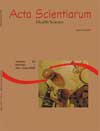<b>Implications of a new pregnancy in women's multiple pregnancy family</b> - DOI: 10.4025/actascihealthsci.v26i2.1595
Abstract
This study aimed to understand the implications of a new pregnancy in a family with multiple pregnancy cases. Thus, Ethnonursing qualitative method was chosen, applying Leininger's observation model, reflection and participation (1991), with 07 multiple pregnancy cases under prenatal care in the Family Development Center of Fortaleza. The results showed that women's multiple pregnancies basically depended on the relationship with their male mates, who exerted power and dominance over them. Such attitudes, involving subordination, submission self-denial are in strict accordance to gender concepts, which establish gender roles in man/woman relationships. Therefore, pregnancy and maternity are, even nowadays, ruled by myths, faiths and habits that invade the life of any women of multiple pregnancy by overloanding them in terms of silenced social violence.Downloads
Download data is not yet available.
Published
2008-03-31
How to Cite
Ximenes, L. B., & Varela, Z. M. de V. (2008). <b>Implications of a new pregnancy in women’s multiple pregnancy family</b> - DOI: 10.4025/actascihealthsci.v26i2.1595. Acta Scientiarum. Health Sciences, 26(2), 311-317. https://doi.org/10.4025/actascihealthsci.v26i2.1595
Issue
Section
Nursing
DECLARATION OF ORIGINALITY AND COPYRIGHTS
I Declare that current article is original and has not been submitted for publication, in part or in whole, to any other national or international journal.
The copyrights belong exclusively to the authors. Published content is licensed under Creative Commons Attribution 4.0 (CC BY 4.0) guidelines, which allows sharing (copy and distribution of the material in any medium or format) and adaptation (remix, transform, and build upon the material) for any purpose, even commercially, under the terms of attribution.
Read this link for further information on how to use CC BY 4.0 properly.
























5.png)







